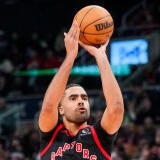
NBA, union agree that likely bonuses cannot be used as outgoing salary in trades after Rockets craft deal with Nene
The Rockets used a loophole to sign Nene to a team friendly, tradable contract
Earlier this month, the Houston Rockets signed big man Nene to an innovative contract, which we covered in more detail here. The deal guaranteed Nene only the veteran's minimum, but included more than $7 million in bonuses that the NBA deemed likely. In laymen's terms, that meant that the Rockets could trade Nene as if his salary were $10 million, but Nene would only be guaranteed a small portion of that amount.
The deal was not officially approved by the NBA in the days that followed. It did not violate the collective bargaining agreement, but rather exploited a rule that no team had ever thought to use. There are no caps on likely bonuses, meaning teams could legally inflate the salary numbers of their players this way under certain circumstances. According to Bobby Marks of ESPN, "the NBA is allowed to interpret the agreement as a violation of the spirit of the rules," which was what caused the holdup.
The contract itself was approved on Thursday, but according to Shams Charania of The Athletic, that came with a caveat. Nene's inflated salary number cannot be used in a trade. In other words, the Rockets are still on the hook for Nene's bonuses if he meets the criteria, but they cannot use those bonuses as a means of circumventing the salary cap in a trade. This essentially punishes the Rockets for their creativity in crafting the deal, as they likely would not have included such bonuses without the benefit of a potential trade.
Such a ruling is largely unprecedented in NBA history. The last major deal to be rejected by the league office was a seven-year pact between Juwan Howard and the Miami Heat in 1996. In that instance, however, the Heat did not have the necessary cap room to give out such a contract. The Rockets abided by the rules set forth in the collective bargaining agreement, and are not the first team to try to use incentives as a method of circumventing the cap.
Multiple teams did so this offseason, in fact, though through a different approach. Both the Brooklyn Nets and Los Angeles Lakers signed a number of free agents to contracts that included hefty unlikely incentives, which don't count towards the salary cap once they have been signed and can account for up to 15 percent of a player's contract. In both instances, the Nets and Lakers were able to create artificial cap room this way.
The Miami Heat popularized the practice during the 2010 offseason, and it has become a somewhat standard practice for teams acquiring superstars in a given offseason. The likeliness or unlikeliness of a bonus is determined only by whether the criterion was met in the prior season, so the Lakers, Nets and Heat set bonuses based on win totals that would likely be eclipsed with a superstar incoming, but were still technically considered unlikely because they had not been met the year before.
None of those teams were punished for exploiting that component of incentive-based compensation, but the practice has been criticized by cap analysts, and now that the league and union have denied Houston's plan to use it in order to create a trade asset, the league may need to reconsider all of its bonus rules during the next round of CBA negotiations. Both likely and unlikely incentives have been used by teams as a method of violating the spirit of the CBA. Rather than selectively enforcing that spirit, the league and union would be best-served setting ironclad rules on the subject once and for all.


















